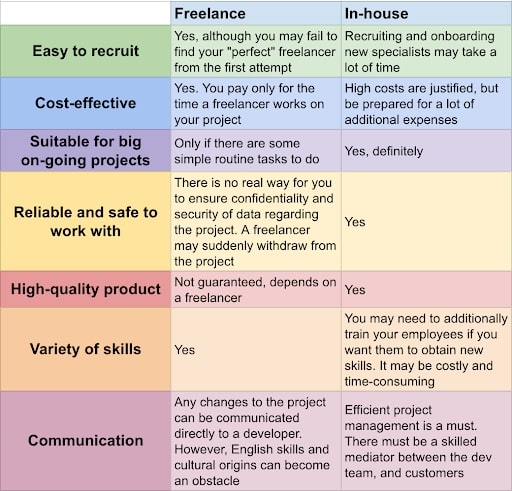If you are a tech entrepreneur, you will surely decide on which kind of developers you’d rather hire for your startup. In-house professionals bring more security feeling but demand more expenditures. Freelancers can be scammy but are pretty cheap. In this article, we will give you some advice on wise choices.

Why distinguishing between in-house and freelance development is important?
At first glance, it might seem that the difference is insignificant. Both categories of developers create and maintain software, so why even bother comparing in-house vs. freelance software development?
The truth is that different projects require different approaches. A suitable solution for a small startup might be a waste of resources for a bigger company.
What is in-house development?
If a company employs and houses a team of programmers, analysts, and technicians to create software products using its capacities, it is called in-house development. Although it is a reliable method providing you with greater control over all development process stages, it still possesses several drawbacks.
What is freelance development?
Freelance development implies that you hire one or several independent contractors to work on your project. Using the services of freelancers is much cheaper than sustaining an in-house team of employees, but the risks are also higher.
Freelance or in-house development: what to choose?
To understand what would be a better option, you should first clearly understand how your business can benefit from using either in-house or freelance developers. Analyzing the pros and cons of in-house vs. freelance software development will help you make a better decision.
Working with in-house developers
Startups for sale
If you have a prospective idea that interests a bigger company, you might want to hire an in-house team of highly skilled developers to research and develop it.
Let’s say you start a business by substituting conventional mobile devices with foldable interactive screens. A tech giant such as Apple gets interested in your groundwork. The company board holds a meeting and discusses your foldable displays. “This technology looks promising; we could use it in our new iPhone,” they decide.
In this case, the said tech giant will likely buy everything you worked on: the idea, the prototypes, your in-house iOS developer team, etc.
In the battle of freelance vs. in-house development, this is the argument in favor of hiring an in-house developer.
Software development companies
One thing is when you need a software specialist to do maintenance and routine or to cover one-time tasks. Another is when your company lives on developing serious software: corporate security solutions, antivirus programs, accounting solutions for businesses, and so on.
You might want to rely on in-house developers in this case. A well-coordinated team run by a CTO, every member of which knows their duties and can work on their set of specific tasks on a regular basis, is a better option here than freelancers.
Сompanies in need of ambassadors
If your business implies meeting with numerous people, all of which are related to software development, you might need a person able to perform representative functions.
Companies with consistent workloads
If you know your business will operate with regular workloads that are unlikely to run out or decrease, it makes more sense to hire an in-house team of developers.
Cash cows
If your business generates stable revenues and your burn rate does not shorten your runway (in other words, if your financial situation is stable), you might consider hiring in-house developers. Treat it as a form of investment into an even safer future.
Companies working in the business-to-government model

If you work as a contractor for the government, confidentiality might be one of your biggest concerns. Signing a nondisclosure agreement with a freelancer is an unreliable measure. Contrarily, working with in-house developers is safer regarding security and privacy. The same refers to big corporations.
In-house development: strengths
The benefits of an in-house web developer (any in-house developer, in fact) include:
- Univocal ownership rights. Since you run the company developing software, you own the source code as well;
- Security. No third parties are involved in the development process, and confidentiality is easier to keep;
- Efficient crisis management. It is easier to mobilize an in-house team to address emergencies than freelancers scattered across the globe;
- Homogenous working environment. All members of an in-house team will most likely have the same cultural background, which minimizes the risk of conflicts and misunderstandings within the team;
- The high quality of the work done. A collective of developers working together on a regular basis can produce a product of better quality—software quality assurance (SQA) helps ensure defects are caught early;
- Regular maintenance and support of the created products. Bug fixing, optimization, tech support, and similar procedures are more comfortable with an in-house team.
In-house development: weaknesses
- High costs. The average salary of in-house developers in any Western country is traditionally high, so be prepared to provide it. Also, sustaining a team of in-house developers implies additional expenses in the form of taxes, insurance payments, paying office rent, etc.;
- Training difficulties. When working with freelancers, you can hire a new specialist with a specific set of skills you need at the moment. In the case of in-house developers, you have to train the existing ones. It can be costly and distracts them from doing their actual job;
- Communication. Project and account management must be at a high level to ensure effective communication of ideas and tasks within the team;
- Recruiting is time-consuming and resource-intensive. You need not just to find a suitable candidate but onboard them and provide them with a workplace and equipment required for work;
- Slow adaptation. Software development is an ever-changing field, and as such, it requires developers to update and expand their knowledge continually. It may be a problem for in-house specialists, who mostly spend their time working on the same tasks over and over again;
- 8-hour workday. Any emergency may have to wait until the next working day. If it happens before the weekend – well, so much the worse for you.
Working with freelance developers
Before reviewing the advantages and disadvantages of freelance development, you must understand which cases you should hire freelancers.
When to hire freelance developers
Remote companies
Hiring freelance developers might be a panacea if you work in a distant place with little to no access to qualified labor force.
Companies operating in overheated markets
Here are a few things you can do to reduce the risk of being scammed on a freelance platform:
- Carefully review the client’s profile and history on the platform before accepting a job. Look for red flags such as a lack of previous work history or reviews or a high number of negative reviews.
- Communicate with the client before accepting the job to clarify the details and terms of the project. This can help prevent misunderstandings that could lead to problems later on.
- Use the platform’s built-in tools for communication and payment. This can provide some level of protection if something goes wrong.
- Consider requesting a partial payment upfront, especially for larger projects. This can help protect you if the client disappears or is unwilling to pay for your work.
- Be cautious of clients who ask you to use an alternate payment method, such as a wire transfer or prepaid debit card. These methods are often used by scammers because they are difficult to trace.
Overall, the best way to reduce the risk of being scammed is to use common sense and be wary of any job that seems too good to be true.
If your business is located in an area where developers with ridiculously high hourly rates are snapped up like hotcakes, you might want to outsource for freelancers from afar.
Small but growing companies

A website is vital for any business, especially for a small one. Hiring in-house developers only to create and maintain a landing page is unreasonable, so you might want to find a freelancer instead.
Companies with irregular workloads
If your work implies working from project to project, keeping an in-house team of developers can cost you a lot. Outsourcing for freelancers for each particular project is better in this case.
Midterm projects
Projects that last up to one year can benefit from hiring freelancers significantly since the project’s duration is too short for hiring an in-house team of developers.
Projects on open-source e-commerce platforms
The advantage of an open-source e-commerce platform is the ability of a user to adjust it according to their needs. Hiring an e-commerce freelance developer for setup and maintenance is a good idea.
Freelance development: strengths

The advantages of freelance software development can make a difference if you use them wisely. Let us take a closer look.
- Cost-efficiency. With the highest hourly rates of approximately $70 in the United States, freelance development is still a more affordable option than hiring development agencies. Prices go even lower if you recruit in Eastern Europe.
- Variety of available skills. On the market, you can find any set of development skills. Whatever it is that you need, you can hire a respective specialist in a couple of clicks.
- Adaptability. Because of intense competition, freelancers need to keep pace with modern trends in development;
- Direct communication. There is no mediator between you as a customer and a developer. You can communicate the project’s specifications, wishes, and changes directly to your developer.
- Easier to supervise and manage. If you are of a controlling type, with the help of tools like Trello or TeamViewer, you can directly monitor and influence the development process.
- Availability. In-house developers work during a regular 8-hour workday, usually. Freelancers can work on your project whenever you need them.
Freelance development: weaknesses
- Reliability issues. Due to personal circumstances (e.g., sickness) or irresponsibility, a freelancer can withdraw from your project, and there are little to no ways you can prevent it.
- Safety. You must realize that any sensitive data and valuable information on the project you entrust to a freelancer cannot be protected as effectively as when working with in-house teams.
- Recruiting by trial and error. Sometimes, you can have little means to ensure a freelancer is a pro before they start working on your project.
- Language and cultural barriers. If a freelancer has poor English skills, communicating with them might pose a problem. Cultural differences may become a source of misunderstandings in the future.
- Quality assurance issues. If you are not a coder yourself, there are fewer ways for you to ensure a freelancer is doing a good job.
Conclusion
Comparative analysis
The in-house vs. freelance comparison can be briefly displayed in the form of a table below:

As you can see, the advantages of freelance developers are mostly related to flexibility and efficiency in the short-time perspective. At the same time, according to research, in-house development is more reliable and safe, has less variation in the quality of work, and is more suitable for long-term projects. And we haven’t even talked about freelance vs. software development companies yet, either!
Hire at Lemon.io
If you are looking for freelance developers for your project but feel unsure about how to do it right, try hiring at Lemon.io.
We carefully test outsourced developers for their professional, communicative, and English skills and make sure only skilled and motivated ones get to work with our customers.
Many of our freelance developers work full-time, and their income depends on how well they perform. So, you will get to work with the most motivated and competent contractors.
Contact us, and we will find you a specialist who best suits your current needs.









